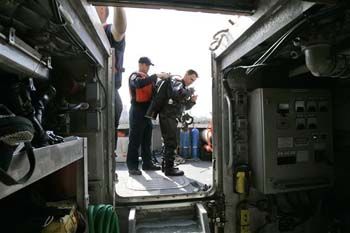By Mimi Hall
USA TODAY
Related: How to start a dive team
 Lt. John Harkins, left,Commanding Officer of the New York City Police Department’s Harbor Unit Scuba Team helps Det. Rob Rodriguez with his dry suit and oxygen tank as he prepares for a dive to inspect the pier that houses the Wall St. Heliport, May 22, 2007, in New York. AP Photo/Mary Altaffer) |
Hundreds of police and rescue scuba team divers, long tasked with pulling bodies and crime-scene evidence from the murky depths, are being trained by the Coast Guard as part of a new post-9/11 mission to help protect the nation’s ports, harbors and waterways against terrorists.
“For the first time in the (scuba) industry, we have a malicious threat to manage,” says Steven Orusa of the International Association of Dive Rescue Specialists. “Any place that has water in its jurisdiction may have a risk — recreational, commercial, shipping or industrial.”
No one keeps count of how many dive teams there are across the country, but those who work in the field say there are hundreds, maybe thousands. Some are small volunteer fire company units; some are big-city operations, responsible for underwater security at huge commercial shipping ports, with dozens of divers and millions of dollars worth of equipment.
The Coast Guard, which was moved into the Homeland Security Department in 2003 and is responsible for overall port security, encourages the port-based teams to take advanced training courses in underwater security.
Some teams get new equipment, such as underwater robots and sonar systems.
Kenneth McDaniel, chief of underwater port security for the Coast Guard, says his unit worked with Homeland Security’s intelligence division to develop a course that teaches divers how to search for and identify “underwater hazardous devices” or explosives that might have been placed on ship hulls, bridges or piers.
The Coast Guard also has a dozen of its own diver teams as part of quick-response teams established after 2001 to help with port and offshore security.
Team members — the Coast Guard won’t say how many divers there are, but the number has doubled since 9/11 — can move in fast when intelligence indicates a threat.
In most cities, underwater security is the responsibility of local police and other agencies.
“We do underwater hull searches, and we sweep ports,” says Orusa, leader of a dive team that covers Chicago and other towns. “There’s a whole layer of skill sets we’ve developed.”
In Jacksonville, the 16-member dive team responsible for underwater security is part of the Sheriff Department’s Homeland Security division. In the past two years, the team has received $596,000 from Washington to buy equipment, including boats, a sonar system and an underwater ROV (remotely operated vehicle), according to Roy Henderson, the city’s Homeland Security chief.
The FBI is concerned that terrorists will learn some of the same underwater skills. Last week, the FBI asked dive shop owners to be on the lookout for anyone suspicious asking for advanced diver training.
Copyright 2007 USA TODAY
SCU

